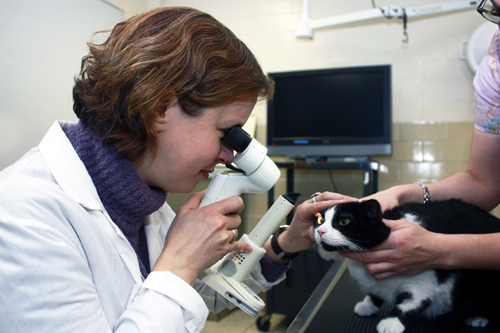
OVC scientists are working to increase understanding of a common inflammatory eye disease in cats and assess the safety of drugs that may be used to treat it.
Supported by a grant from the OVC Pet Trust Fund, the study is led by Dr. Chantale Pinard, Clinical Studies. The researchers are examining the role of a particular enzyme in uveitis and the effects of non-steroidal anti-inflammatory drugs (NSAIDS) often used to treat the condition in other species.
Uveitis – an inflammatory condition that affects the middle layer or coloured part of the eye – is one of the more common eye diseases known to affect cats. Over the past decade, one in four cats presented to the OVC Health Sciences Centre has had the disease, which if left unchecked can lead to chronic pain, glaucoma and blindness, says Pinard, a board-certified ophthalmologist.
“It is an important disease that is quite prevalent in the general cat population. But it can be caused by a number of things, so it is difficult to diagnose and treat correctly,” says Pinard, who is working on the study with Drs. Ron Johnson, Jeff Caswell, Stephanie Nykamp and Dana Allen as well as Dr. Kimberly Hsu (an OVC graduate student).
They’ll be studying COX-2, an enzyme linked to inflammatory eye conditions in dogs but whose role in feline eye diseases is unclear. NSAIDS act by inhibiting COX enzymes, but when administered orally, they can harm the kidneys, liver and gastrointestinal tract. This is particularly true in cats because their livers cannot metabolize NSAIDS.
“There are no veterinary-approved NSAIDS for cats and dogs, and we don’t know enough about how their systems absorb medication to predict how much can be used without damaging side effects, or whether they can be used safely in combination with other drugs. We’re hoping this study will answer some of those questions.”